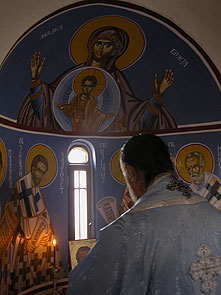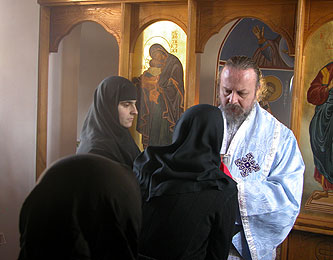We are justly condemned… ( 25.01.2008 )
Today, on the feast day of the Holy Martyr Tatiana, Metropolitan Nahum of Strumica celebrated Divine Liturgy. At the Liturgy we prayed for the soul of God’s child Todor Proeski to rest in peace.
“The historical event, related in the Holy Gospel, of Christ’s crucifixion on the Cross between the two thieves, who were also crucified on two other crosses, is perhaps one of the most truthful images in which we can recognize the state of all people, in relation to God just as in relation to themselves.
The cross are all our sufferings—whether or not of our own volition—which we encounter on the narrow evangelical road of fulfillment of God’s commandments. The cross can remain only a great punishment for them who do not repent for their sins. It is not that God punishes us, it is rather us who punish ourselves, detaching ourselves from God and joining the devil through fulfillment of the devil’s will. The accomplishment of the demonic will is nothing but sin, absence of grace, falling from God, suffering and illness of body and soul, and eventually death, with no hope.
We can all see and recognize ourselves in one of the two thieves. We all are carrying our cross, only that some of us give thanks to God for their cross and carry it with patience and humility, aware of their sinfulness and imperfection, whereas others blaspheme God because of their cross. To them who give thanks to God, the cross helps to purify their heart from the passions, to illumine their mind and to become deified. To them who blaspheme God, the cross remains merely an unbearable burden and an incomprehensible and unendurable punishment. Certainly, you have in mind that I am telling you about the general line, not about the occasional oscillations. Also, self-knowledge in relation to God and gratitude for the cross that God has granted us are inseparable.
With patience and humility can carry his cross only he who gives thanks to God for his sufferings and has become aware in himself that he truly deserves them. The greater the suffering we experience and the more sincerely and from all our heart we give thanks to God for that, the more grace of God we attract to ourselves. God’s grace, for its part, is what gives us strength to endure the sufferings, what consoles us in sufferings and what even makes us forget about them. Or, in other words, God’s grace is what purifies, illumines and perfects us, depending on the stage of spiritual development at which we are carrying our cross.
Truly beautiful evangelical model of proper carrying of one’s cross is the thief crucified together with Christ, to whom, at the moment when he confesses his sinfulness humbly and without blaspheme enduring the sufferings—we are justly under condemnation, for we receive the due reward for our deeds; but this Man has done nothing wrong—his eyes open so he can see and recognize the crucified Godman: then he said to Jesus, “Lord, remember me when You come into Your kingdom.” And Jesus said to him, “Assuredly, I say to you, today you will be with Me in
In contrast to the thief, who as a starting position for receiving of this gift of God has only the awareness of his sinfulness and the proper confession with thankfulness, today we as a criterion and foundation of our Christian existence and activity have Christ’s word and deed, the perfect love of God the father (Matthew 5:44-48) and the seal of the gift of the Holy Spirit. We have the unity of faith and the concilliar union of the Holy Spirit both among us and with our Fathers, who with their everliving model continuously enlighten our life and existence in the Church. Therefore we must not let that happen: to discover the
We should know two more spiritual laws. Firstly, we recognize God’s love also in that he allows us to suffer only as much as it is necessary for our salvation, not as much as we have deserved, according to the sin committed. If God judged us only in conformity with how we judge other people, let alone in conformity with our sins, then we had better not be born! Glory to You, Lord! God’s justice is love, not paying back evil for evil. Such should be also the justice of everyone who wants to call oneself a Christian. And secondly, the cross of him who is at the first degree of spiritual development consists in the struggle of purification of his heart from passions through perfect obedience and through blaming himself for every evil that happens. The cross of him who is at the second degree of spiritual development consists in the many-hour practice of prayer of the mind in the heart and in the love toward the enemies. The cross of him who is at the third degree of spiritual development, according to the Holy Fathers, consists in the mourning for the whole Adam…
However, I am not talking about a Cross without Resurrection! And I am not talking about a Cross that simultaneously in itself does not bring also the power, the consolation and the uncreated light of the Resurrection!”
We dedicate this homily to Patriarch Paul and Archbishop Christodoulos,
who are carrying their cross with humility and gratitude.
May the Lord help them to endure to the end.
(the editorial staff of the MOC website)

